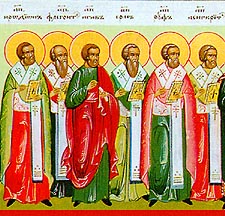|
|||
|---|---|---|---|
| This weekly bulletin insert complements the curriculum published by the Department of Christian Education of the Orthodox Church in America. This and many other Christian Education resources are available at http://dce.oca.org. | |||

Anyone who reads the Bible knows about the Old Testament prophets, men and women who tell God's people about His will and His plans. But the Church also celebrates a man who prophesied in the New Testament. This Christian prophet, Agabus, is mentioned twice in the Book of Acts. The first time, he is one of several prophets who come from Jerusalem to Antioch (11: 27-30). His prophecy reminds us that having the prophetic gift often means having to say hard things, and to deliver bad news. Agabus stands up and foretells, by the power of the Holy Spirit, a great famine "throughout all the world" in the days of the emperor Claudius. The prophecy did come to pass at the time he said it would, starting in Judea and then spreading out to afflict the people of Italy and Greece. The famine foretold by Agabus was a serious problem for the young Church to deal with as it struggled to establish itself in the Empire. But at the same time, it gave believers an urgent reason to practice the compassion the Lord had taught them. The very next verses of Acts tell us that the disciples, "each according to his ability" sent relief to the people in need. They gave their gifts to Barnabas and Saul, who would later be called Paul, to deliver. Agabus next appears in Acts 21. Saint Paul and his companions have been traveling by ship. Paul wants to reach Jerusalem in time for Pentecost. The group has now come to Caesarea, where they stay with Philip, who is one of the seven deacons, with Stephen the Protomartyr, chosen to help the apostles. Philip's four daughters are prophetesses, and it is in this atmosphere of prophecy that Agabus, coming from Judea, encounters Paul. He prophesies in a dramatic manner. Taking Paul's belt, he binds his own hands and feet with it and announces, "Thus says the Holy Spirit, 'So shall the Jews at Jerusalem bind the man who owns this belt, and deliver him into the hands of the Gentiles.' " This graphic style puts Agabus directly in the tradition of the Old Testament prophets. Isaiah walked "naked and barefoot" as a warning to Egypt. Jeremiah wore a linen sash and then hid it and let it rot, a symbol of God's intention for Judah and Jerusalem.
Agabus' terrifying prophecy makes Paul's companions beg him not to go to Jerusalem. He is touched by their pleas, but not dissuaded. He says, "What do you mean by weeping and breaking my heart? For I am ready not only to be bound, but to die at Jerusalem for the name of the Lord Jesus." In the face of such determination, the companions can only say, "The will of the Lord be done." Prophecy is one of many things that continued from the Old Testament into the New. It shows us that God has been with us, working in our lives, from the first day to the day we are living right now. |
|||
